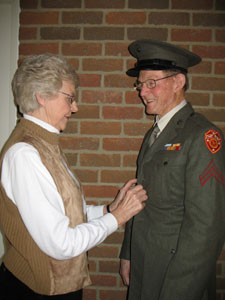By Margie Wuebker
mwuebker@dailystandard.com NEW BREMEN -- Vivid memories of military service during the World War II era lurk in Martin Dabbelt's bedroom closet.

The olive drab uniform, complete with two red corporal's stripes and a patch denoting a hitch with Fleet Marine Force-Pacific, hangs in mute testimony to a young man's commitment to answer Uncle Sam's call more than six decades ago.
Dabbelt, an 83-year-old resident of 27 Rummel Creek Drive, dons the heavy wool jacket and trousers to prove they still fit. He then reaches for the matching hat with its shiny black bill and etched medal showing a majestic eagle atop a world globe.
"I think the hat shrank a bit over the years," he says with a smile. "It is a little tighter than I remember."
The retired farmer surprised other attendees at a recent U.S. Marine Corps birthday dinner by showing up in uniform. Photographs taken that night at Speedway Lanes in New Bremen show him standing proud with young Marines in full dress. "These standard-issue uniforms came at no cost," he
says. "You had to pay for the fancy dress blues."
Dabbelt had worked for Minster-area farmer Bill Beckman following his Coldwater High School graduation. The war gradually resulted in a shortage of young men to work the fields, milk the cows and slop the hogs.
He watched relatives and friends leave for foreign shores, knowing it was only a matter of time before Uncle Sam called. The expected notice came in August 1944 when he was 22.
"I really wanted the Air Force but I figured it would be the Navy," he says. "The Marines got me instead based on numbers."
Draftees from cities, villages and rural areas reported to designated locations. They obediently formed lines at reception centers and counted off with a designated number assigned to each military branch.
Following boot camp at Parris Island, S.C., he was assigned to San Diego, Calif., and then the Hawaiian island of Maui.
"None of us had a specialization at that point," he recalls. "If the sergeant told you to peel potatoes, you peeled potatoes. If he said sweep the floor, you swept the floor without complaint."
Hours spent on the rifle range were intended to prepare Marines for possible wartime assignments. Everyone had to swim well enough to save themselves in the event orders came to abandon ship or an amphibious landing craft.
He saw his share of GIs returning from the war looking exhausted and drawn.
"The brass would tell us to offer assistance but not ask a lot of questions," Dabbelt says. "Some of the guys talked freely; others did not mention a thing associated with war. Most wanted a hot meal, a cold bottle of beer and a comfortable bed."
There was only one time Dabbelt feared for his life. Shortly before the war ended in 1946, a group of insurgents opened fire on American troops stationed in Maui. Bullets whistled by kicking up dust and sending men scurrying for cover.
"I was real lucky," Dabbelt admits with a sigh. "I got a taste of what other soldiers faced on the battlefield that day. The war ended the next day and calm returned."
The Marines in his unit were permitted to take their heavy wool uniforms home upon discharge. Most did but a few wanted no part of anything related to the military.
At home, civilian life brought twists and turns along with romance. Rita Boerger, an attractive employee he met at Wolf's Hotel in Minster, later became his wife. Their family grew over the years with the addition of four children and then 12 grandchildren.
Years spent hoisting heavy milk cans on and off a double-deck milk truck resulted in muscles that defied the expertly tailored uniform.
"It used to hang in an upstairs closet," Rita Dabbelt says. "We took it along when we moved to town."
The former Marine's slender physique returned in later years and he decided to try on the garment. It fit pretty well to his delight.
"I almost feel ready for inspection," he says proudly. "That was an ordeal nobody liked -- everything pressed to perfection and shoes shined to a mirror finish. Things like that are hard to forget." |

